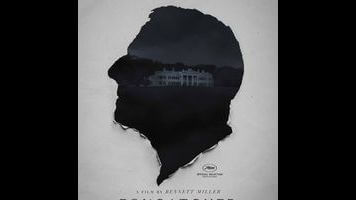The speculative Foxcatcher turns true crime into unconvincing Greek tragedy

There’s no easy way to write about Foxcatcher, Bennett Miller’s oppressively dour new movie, without disclosing the shocking ending to its true story. Still, for the sake of those who don’t know where this fact-based drama is headed, perhaps it’s best to be vague about the events that inspired it. In general terms, the film concerns the relationship between two Olympic wrestlers, brothers Mark and David Schultz, and the millionaire heir who became their sponsor. Headline infamy would eventually entwine these men, and Foxcatcher attempts to make sense of the senseless crime for which they’re now remembered. In doing so, the movie reaches for big insights about America’s obsession with winning and the dangers of unchecked entitlement, while simultaneously treating its real-life subjects like the stars of a Greek tragedy. What it never quite does, however, is provide a convincing explanation—dramatic, psychological, or otherwise—for the incident it inexorably builds toward.
Much of Foxcatcher’s somber narrative is drawn from the memories and memoirs of the younger Schultz brother, whose perspective the film largely adopts. The strong and silent type, Mark (Channing Tatum, seething with perpetual resentment) is first seen living alone in college-town Wisconsin, his Olympic glory days apparently behind him. Intrigued by the opportunity to step out from under the shadow of his beloved big brother, Mark accepts an offer to come live at the vast Pennsylvania estate of John Du Pont, where he’ll train for the 1988 Olympics under the banner of “Team Foxcatcher.” Du Pont, played by a cast-against-type Steve Carell, is a wealthy eccentric with a pet interest in the sport. Fancying himself a mentor figure, he proves more than willing to take Mark under his wing. But it’s the more revered older brother, David (Mark Ruffalo), that Du Pont really wants on the team—and once he’s secured the man’s involvement, tensions at Foxcatcher Farm rise from a simmer to a boil.
Something deeply complicated could have been made out of the relationship between Mark and Du Pont, two lost souls drawn together by a mutual desire for approval. But the script, by Something Wild author E. Max Frye and Miller’s Capote screenwriter Dan Futterman, rarely allows either man to be more than a different side of the same coin—the envious little brother and the insecure, spoiled mama’s boy, respectively. In place of character development, there is thick, depressive mood. Miller lent his last movie, Moneyball, an aura of melancholy, appropriate for a tale of disappointment. Here, he pushes the downbeat atmosphere to nearly self-parodic levels: Though taking place over several seasons, Foxcatcher seems to exist in a kind of perpetual November. The director mutes every color, extends every pregnant pause, and drains every moment of joy or levity. Even the wrestling scenes are glum.
Within this vacuum of malaise, fine performers struggle valiantly to breathe life into their roles. Shedding all traces of celebrity charisma, Tatum shows new shades of intensity, but he’s only been given a single note to play—a bitterness as hard as his abs. Carell, meanwhile, overdoes the aristocratic creep routine. By many accounts, the real Du Pont was an odd duck, and doctors later diagnosed him as a paranoid schizophrenic. Even still, Carell’s version of the fickle benefactor is all ghoulish caricature; acting through a prosthetic schnoz that makes him look like a live-action version of his Despicable Me character, the one-time Office star turns Du Pont into a leering, stilted gargoyle. At best, Carell confirms his gift for playing painfully clueless bosses, as when he attempts to demonstrate basic wrestling moves to a group of athletes who are far beyond them. The film’s greatest scene finds David, who Du Pont has finally convinced to move to the compound, struggling to call the man a mentor on camera. Ruffalo, bulked up and typically excellent, locates dimensions that elude his co-stars.
A mystery of motivation, Foxcatcher never cracks the birdlike noggin of its moneyed antagonist, where answers might lie. Rather, it takes dramatic liberties with history to make its speculative theory “work.” Forget the (fudged) fact that Du Pont’s overbearing mother (Vanessa Redgrave) died before he transformed the family ranch into a sprawling training facility. The real sin of elision is the condensing of the timeline, the way Miller and his writers make the climactic episode appear to have occurred within weeks, maybe even days of the movie’s other pertinent events. In fact, it didn’t arrive until 1996. What transpired in the seven or so years between? The answer is probably integral to understanding this stranger-than-fiction story, but Foxcatcher makes the dramatically convenient case that the truth lies with the well-documented events of years earlier. If there is, in reality, some rhythm or reason to what happened between these men, Foxcatcher doesn’t find it.
For thoughts on, and a place to discuss, the plot details not talked about in this review, visit Foxcatcher’s spoiler space.